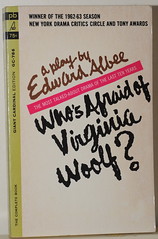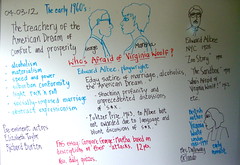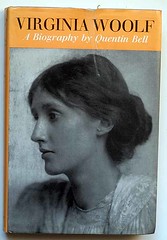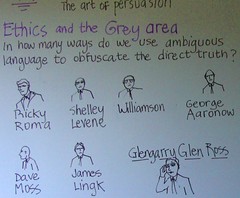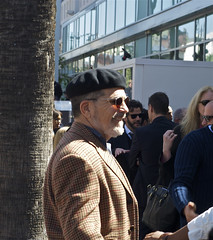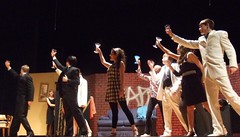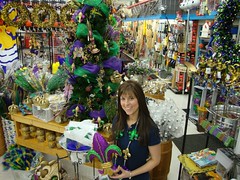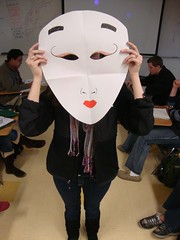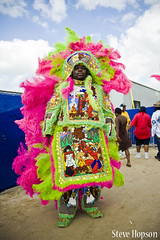Herbert Vogel and Dorothy Vogel, once described as "proletarian art collectors,"[1] worked as civil servants in New York City for more than a half-century while amassing what has been called one of the most important post-1960s art collections in the United States,[2] mostly of minimalist and conceptual art.[3]
They amassed a collection of over 4,782 works, which they displayed, and also stored in closets and under the bed, in their rent-controlled one-bedroom apartment on Manhattan's Upper East Side.[14][15] Though their focus was mainly conceptual art and minimalist art,[16] the collection also includes noteworthy post-minimalist work.[10] Their collection eventually came to include work from artists such as pop artist Roy Lichtenstein, photographers Cindy Sherman and Lorna Simpson, minimalist Robert Mangold and post-minimalist Richard Tuttle.
In 1992, the Vogels decided to transfer the entire collection to the National Gallery of Art because it charges no admission, doesn't sell donated works, and they wanted their art to belong to the public.[17]
In late 2008, they launched The Dorothy and Herbert Vogel Collection: Fifty Works for Fifty States along with the National Gallery of Art, the National Endowment for the Arts, and the Institute of Museum and Library Services.[18] The program donated 2,500 works to 50 institutions across 50 states and was accompanied by a book with the same name. In 2008, an award-winning documentary about their story, Herb and Dorothy, was released.
[edit]
Wednesday, January 30, 2013
Virginia Woolf quotes from Imdb.com
Martha: I swear, if you existed, I'd divorce you.
Honey: I dance like the wind.
Martha: Look, sweetheart, I can drink you under any goddamn table you want, so don't worry about me.
Honey: Oh, I don't know, a little brandy maybe. "Never mix, never worry!"
George: Martha? Rubbing alcohol for you?
Martha: Sure! "Never mix, never worry!"
[Martha has changed into an embarrassingly tight and revealing outfit]
George: Why Martha! Your Sunday chapel dress!
Martha: I hope that was an empty bottle, George! You can't afford to waste good liquor, not on YOUR salary!
George: All I said was that our son, the apple of our three eyes, Martha being a cyclops, our son is a beanbag, and you get testy!
Honey: They dance like they've danced before.
George: It's a familiar dance, monkey nipples, they both know it.
Martha: You make me puke.
George: That wasn't a very nice thing to say, Martha.
George: Martha, in my mind you're buried in cement right up to the neck. No, up to the nose, it's much quieter.
Nick: To you, everybody's a flop. Your husband's a flop, I'm a flop.
Martha: You're all flops. I am the Earth Mother, and you are all flops.
Nick: I'm tired, I've been drinking since nine o'clock, my wife is vomiting, there's been a lot of screaming going on around here!
George: So you get testy, naturally, don't worry about it! Anybody who comes here ends up getting testy, it's expected. Don't be upset.
Nick: I'm not upset.
George: You're testy.
Nick: Yes.
George: Martha is 108... years old. She weighs somewhat more than that.
Nick: Who did the painting?
George: Some Greek with a moustache that Martha attacked one night.
George: Martha, will you show her where we keep the, uh, euphemism?
George: Vanish!
Martha: I disgust me. You know, there's only been one man in my whole life who's ever made me happy. Do you know that?
[pause]
Martha: George, my husband... George, who is out somewhere there in the dark, who is good to me - whom I revile, who can keep learning the games we play as quickly as I can change them. Who can make me happy and I do not wish to be happy. Yes, I do wish to be happy. George and Martha: Sad, sad, sad. Whom I will not forgive for having come to rest; for having seen me and having said: yes, this will do.
George: You take the trouble to construct a civilization, to build a society based on the principles of... of principle. You make government and art and realize that they are, must be, both the same. You bring things to the saddest of all points, to the point where there is something to lose. Then, all at once, through all the music, through all the sensible sounds of men building, attempting, comes the Dies Irae. And what is it? What does the trumpet sound? Up yours.
George: I'm very impressed.
Martha: You're damn right.
George: I said I was impressed. I'm beside myself with jealousy. What do you want me to do, throw up?
Martha: [derogatorily, to George] Hey, swamp! Hey swampy!
George: Yes, Martha? Can I get you something?
Martha: Ah, well, sure. You can, um, light my cigarette, if you're of a mind to.
George: No. There are limits. I mean, a man can put up with only so much without he descends a rung or two on the old evolutionary ladder, which is up your line. Now, I will hold your hand when it's dark and you're afraid of the boogeyman and I will tote your gin bottles out after midnight so no one can see but I will not light your cigarette. And that, as they say, is that.
Martha: Jesus.
Martha: Well, you're going bald.
George: So are you.
Nick: [to Honey] We'll go in a little while.
George: Oh no. No, you mustn't. Martha is changing, and Martha is not changing for me, Martha hasn't changed for me in years. If Martha is changing, that means we're going to be here for days. You're being accorded an honor, and you mustn't forget that Martha is the daughter of our beloved boss. She is his right... arm. I was going to use another word, but we'll leave that sort of talk to Martha.
[George takes a corner far too fast, tossing everyone in the car from side to side. Pause]
Martha: Aren't you going to apologize?
George: Not my fault, the road should've been straight.
Martha: No, aren't you going to apologize for making Honey throw up?
George: I didn't make her throw up.
Martha: What, you think it was sexy back there? You think he made his own wife sick?
George: Well, you make me sick.
Martha: That's different.
Martha: Hey!
George: Hark! Jungle sounds.
Martha: Hey!
George: Animal noises.
George: You're a monster - You are.
Martha: I'm loud and I'm vulgar, and I wear the pants in the house because somebody's got to, but I am not a monster. I'm not.
George: You're a spoiled, self-indulgent, willful, dirty-minded, liquor-ridden...
Martha: SNAP! It went SNAP! I'm not gonna try to get through to you any more. There was a second back there, yeah, there was a second, just a second when I could have gotten through to you, when maybe we could have cut through all this, this CRAP. But it's past, and I'm not gonna try.
Martha: I looked at you tonight and you weren't there... And I'm gonna howl it out, and I'm not gonna give a damn what I do and I'm gonna make the biggest god-damn explosion you've ever heard.
George: Try and I'll beat you at your own game.
Martha: Is that a threat George, huh?
George: It's a threat, Martha.
Martha: You're gonna get it, baby.
George: Be careful Martha. I'll rip you to pieces.
Martha: You're not man enough. You haven't the guts.
George: Total war.
Martha: Total.
George: I used to drink brandy.
Martha: You used to drink bergen, too.
George: Did you really think I was going to kill you, Martha?
Martha: You, kill me? That's a laugh.
George: Well now, I might some day.
Martha: Fat chance.
George: And that's how you play "Get the Guests".
George: Good. Better. Best. Bested.
Honey: I'm gonna be sick.
George: Ah yeah that's nice.
Honey: I'm gonna die.
George: Good, good. Go right ahead.
George: Martha's got money because Martha's father's second wife, not Martha's mother but after Martha's mother died, was a very old lady with warts who was very rich.
Nick: She was a witch!
George: She was a good witch, and she married the white mouse with the tiny red eyes and he must have nibbled her warts or something like that, because she went up in a puff of smoke almost immediately. Poof!
Nick: Poof!
George: Poof! And all that was left, aside from some wart medicine, was a big fat will.
Nick: Your wife never mentioned a stepmother.
George: Maybe it isn't true.
Nick: Who did the painting?
George: Some Greek with a mustache Martha attacked one night.
Nick: It's got a...
George: Quiet intensity?
Nick: Well, no, a...
George: Well then, a certain noisy relaxed quality maybe?
Nick: No, what I meant was...
George: How about a quietly noisy relaxed intensity?
George: Now that's it! You can take over a few classes from the older men, but until you start plowing pertinent wives, you really aren't working. The broad, inviting avenue to man's job is through his wife, and don't you forget it.
Nick: And I'll be your wife has the broadest, most inviting avenue of the whole damn campus.
[long pause]
Nick: Her father president and all.
George: You can sit around with the gin running out of your mouth; you can humiliate me; you can tear me to pieces all night, that's perfectly okay, that's all right.
Martha: You can stand it!
George: I cannot stand it!
Martha: You can stand it, you married me for it!
Martha: A drowning man takes down those nearest.
Honey: I dance like the wind.
Martha: Look, sweetheart, I can drink you under any goddamn table you want, so don't worry about me.
Honey: Oh, I don't know, a little brandy maybe. "Never mix, never worry!"
George: Martha? Rubbing alcohol for you?
Martha: Sure! "Never mix, never worry!"
[Martha has changed into an embarrassingly tight and revealing outfit]
George: Why Martha! Your Sunday chapel dress!
Martha: I hope that was an empty bottle, George! You can't afford to waste good liquor, not on YOUR salary!
George: All I said was that our son, the apple of our three eyes, Martha being a cyclops, our son is a beanbag, and you get testy!
Honey: They dance like they've danced before.
George: It's a familiar dance, monkey nipples, they both know it.
Martha: You make me puke.
George: That wasn't a very nice thing to say, Martha.
George: Martha, in my mind you're buried in cement right up to the neck. No, up to the nose, it's much quieter.
Nick: To you, everybody's a flop. Your husband's a flop, I'm a flop.
Martha: You're all flops. I am the Earth Mother, and you are all flops.
Nick: I'm tired, I've been drinking since nine o'clock, my wife is vomiting, there's been a lot of screaming going on around here!
George: So you get testy, naturally, don't worry about it! Anybody who comes here ends up getting testy, it's expected. Don't be upset.
Nick: I'm not upset.
George: You're testy.
Nick: Yes.
George: Martha is 108... years old. She weighs somewhat more than that.
Nick: Who did the painting?
George: Some Greek with a moustache that Martha attacked one night.
George: Martha, will you show her where we keep the, uh, euphemism?
George: Vanish!
Martha: I disgust me. You know, there's only been one man in my whole life who's ever made me happy. Do you know that?
[pause]
Martha: George, my husband... George, who is out somewhere there in the dark, who is good to me - whom I revile, who can keep learning the games we play as quickly as I can change them. Who can make me happy and I do not wish to be happy. Yes, I do wish to be happy. George and Martha: Sad, sad, sad. Whom I will not forgive for having come to rest; for having seen me and having said: yes, this will do.
George: You take the trouble to construct a civilization, to build a society based on the principles of... of principle. You make government and art and realize that they are, must be, both the same. You bring things to the saddest of all points, to the point where there is something to lose. Then, all at once, through all the music, through all the sensible sounds of men building, attempting, comes the Dies Irae. And what is it? What does the trumpet sound? Up yours.
George: I'm very impressed.
Martha: You're damn right.
George: I said I was impressed. I'm beside myself with jealousy. What do you want me to do, throw up?
Martha: [derogatorily, to George] Hey, swamp! Hey swampy!
George: Yes, Martha? Can I get you something?
Martha: Ah, well, sure. You can, um, light my cigarette, if you're of a mind to.
George: No. There are limits. I mean, a man can put up with only so much without he descends a rung or two on the old evolutionary ladder, which is up your line. Now, I will hold your hand when it's dark and you're afraid of the boogeyman and I will tote your gin bottles out after midnight so no one can see but I will not light your cigarette. And that, as they say, is that.
Martha: Jesus.
Martha: Well, you're going bald.
George: So are you.
Nick: [to Honey] We'll go in a little while.
George: Oh no. No, you mustn't. Martha is changing, and Martha is not changing for me, Martha hasn't changed for me in years. If Martha is changing, that means we're going to be here for days. You're being accorded an honor, and you mustn't forget that Martha is the daughter of our beloved boss. She is his right... arm. I was going to use another word, but we'll leave that sort of talk to Martha.
[George takes a corner far too fast, tossing everyone in the car from side to side. Pause]
Martha: Aren't you going to apologize?
George: Not my fault, the road should've been straight.
Martha: No, aren't you going to apologize for making Honey throw up?
George: I didn't make her throw up.
Martha: What, you think it was sexy back there? You think he made his own wife sick?
George: Well, you make me sick.
Martha: That's different.
Martha: Hey!
George: Hark! Jungle sounds.
Martha: Hey!
George: Animal noises.
George: You're a monster - You are.
Martha: I'm loud and I'm vulgar, and I wear the pants in the house because somebody's got to, but I am not a monster. I'm not.
George: You're a spoiled, self-indulgent, willful, dirty-minded, liquor-ridden...
Martha: SNAP! It went SNAP! I'm not gonna try to get through to you any more. There was a second back there, yeah, there was a second, just a second when I could have gotten through to you, when maybe we could have cut through all this, this CRAP. But it's past, and I'm not gonna try.
Martha: I looked at you tonight and you weren't there... And I'm gonna howl it out, and I'm not gonna give a damn what I do and I'm gonna make the biggest god-damn explosion you've ever heard.
George: Try and I'll beat you at your own game.
Martha: Is that a threat George, huh?
George: It's a threat, Martha.
Martha: You're gonna get it, baby.
George: Be careful Martha. I'll rip you to pieces.
Martha: You're not man enough. You haven't the guts.
George: Total war.
Martha: Total.
George: I used to drink brandy.
Martha: You used to drink bergen, too.
George: Did you really think I was going to kill you, Martha?
Martha: You, kill me? That's a laugh.
George: Well now, I might some day.
Martha: Fat chance.
George: And that's how you play "Get the Guests".
George: Good. Better. Best. Bested.
Honey: I'm gonna be sick.
George: Ah yeah that's nice.
Honey: I'm gonna die.
George: Good, good. Go right ahead.
George: Martha's got money because Martha's father's second wife, not Martha's mother but after Martha's mother died, was a very old lady with warts who was very rich.
Nick: She was a witch!
George: She was a good witch, and she married the white mouse with the tiny red eyes and he must have nibbled her warts or something like that, because she went up in a puff of smoke almost immediately. Poof!
Nick: Poof!
George: Poof! And all that was left, aside from some wart medicine, was a big fat will.
Nick: Your wife never mentioned a stepmother.
George: Maybe it isn't true.
Nick: Who did the painting?
George: Some Greek with a mustache Martha attacked one night.
Nick: It's got a...
George: Quiet intensity?
Nick: Well, no, a...
George: Well then, a certain noisy relaxed quality maybe?
Nick: No, what I meant was...
George: How about a quietly noisy relaxed intensity?
George: Now that's it! You can take over a few classes from the older men, but until you start plowing pertinent wives, you really aren't working. The broad, inviting avenue to man's job is through his wife, and don't you forget it.
Nick: And I'll be your wife has the broadest, most inviting avenue of the whole damn campus.
[long pause]
Nick: Her father president and all.
George: You can sit around with the gin running out of your mouth; you can humiliate me; you can tear me to pieces all night, that's perfectly okay, that's all right.
Martha: You can stand it!
George: I cannot stand it!
Martha: You can stand it, you married me for it!
Martha: A drowning man takes down those nearest.
Tuesday, January 29, 2013
Quiz, Who's Afraid of Virginia Woolf? Edward Albee
Name the speaker for quotes 1 - 13. George, Martha, Nick, Honey
1. "Will you show her where we keep the, uh, euphemism?"
2. "In my mind, you are buried in cement right up to the neck. No, up
to the nose — it's much quieter."
3."I hope that was an empty bottle! You can't afford to waste good liquor."
4. "Never mix, never worry!"
5. "Unless you're carrying on like a hyena, you're not having any fun."
6. "Don't worry about it! Anybody who comes here ends up getting
testy; it's expected! Don't be upset!"
7. "They're dancing like they (have) danced before."
8. "There was a second back there — yeah, there was a second, just a
second — when I could have gotten through to you, when maybe we could
have cut through all this, this CRAP! But it's past, and I'm not gonna
try."
9. "To you, everybody's a flop!"
10. "I disgust me."
11. "Someone who can keep learning the games we play as quickly as I
can change them."
12. "Truth or illusion; you don't know the difference."
13. "A drowning man takes down those nearest."
14. Northeast state in which the WAVW college is located. __
15. Welsh actor who won fame playing King Arthur in the musical
"Camelot." Also appeared in the movie "Cleopatra." __ __
16. One exploration of WAVW is that of the facade of married couples.
What's the name for the diacritical mark that makes the hard C sound
into an S sound? ___
17. In 1966-67 WAVW won the Pulitzer Prize for literature. T / F
18. US president who was in office when the play of WAVW debuted (1962). ____
19. English author, essayist, publisher, and writer of short stories, regarded as one of the foremost modernist literary figures of the
twentieth century.
20. Word that begins with "n" that means "ready or suitable for marriage by virtue of age or maturity."
Discussion of the answers
1.G 2.G 3.M 4.H 5.G 6.G 7.H 8.M 9.N 10.M 11.M 12.M 13.M 14.Conn 15.Richard Burton 16.cedilla 17.False 18.JFK 19.Virginia Woolf 20.nubile
Tuesday, January 22, 2013
The epochal drama "Who's Afraid of Virginia Woolf?"
Who's Afraid of Virginia Woolf? won both the 1963 Tony Award for Best Play and the 1962–63 New York Drama Critics' Circle Award for Best Play.
Its stars won the 1963 Tony Awards for Best Actor and Actress as well. It was also selected for the 1963 Pulitzer Prize for Drama by that award's drama jury. However, the award's advisory board—the trustees of Columbia University—objected to the play's then-controversial use of profanity and sexual themes, and overruled the award's advisory committee, awarding no Pulitzer Prize for drama in 1963.
In this scathing satire of modern marriage, the border between fiction and reality is continually challenged.
The play ends with Martha answering the titular question of who is afraid to live their life free of illusions with, "I am, George, I am." Implicitly, exposure is something everyone fears: façade (be it social or psychological), although damaging, provides a comfort.
Quotes and vocab -
- "What a dump."
- You never DO anything."
- "Braying at everyone . . . "
- "Are you sulking?"
- "You make me puke."
- "I like your anger. That's what I like about you the most."
- "I can drink you under the g*dd*mned table."
- If you existed, I'd divorce you."
- "Unless you're carrying on like a hyena, you're not having fun."
- euphemism
- "Dashed hopes; good intentions."
- "Good, better, best, bested."
- Rearranging the chromosomes. Making everyone the same."
- "The ants will take over the world."
- "I hope that was an empty bottle. You can't afford to waste a bottle of liquor on an associate professor's salary."
Its stars won the 1963 Tony Awards for Best Actor and Actress as well. It was also selected for the 1963 Pulitzer Prize for Drama by that award's drama jury. However, the award's advisory board—the trustees of Columbia University—objected to the play's then-controversial use of profanity and sexual themes, and overruled the award's advisory committee, awarding no Pulitzer Prize for drama in 1963.
In this scathing satire of modern marriage, the border between fiction and reality is continually challenged.
The play ends with Martha answering the titular question of who is afraid to live their life free of illusions with, "I am, George, I am." Implicitly, exposure is something everyone fears: façade (be it social or psychological), although damaging, provides a comfort.
Quotes and vocab -
- "What a dump."
- You never DO anything."
- "Braying at everyone . . . "
- "Are you sulking?"
- "You make me puke."
- "I like your anger. That's what I like about you the most."
- "I can drink you under the g*dd*mned table."
- If you existed, I'd divorce you."
- "Unless you're carrying on like a hyena, you're not having fun."
- euphemism
- "Dashed hopes; good intentions."
- "Good, better, best, bested."
- Rearranging the chromosomes. Making everyone the same."
- "The ants will take over the world."
- "I hope that was an empty bottle. You can't afford to waste a bottle of liquor on an associate professor's salary."
Virginia Woolf, a female writer of independence and daring
Adeline Virginia Woolf (1882 - 1941) was an English novelist and essayist, regarded as one of the foremost modernist literary figures of the twentieth century.
Her most famous works include the novels Mrs Dalloway (1925), To the Lighthouse (1927) and Orlando (1928), and the book-length essay A Room of One's Own (1929), with its famous dictum, "a woman must have money and a room of her own if she is to write fiction."
Woolf, says Wikipedia, is considered one of the greatest innovators in the English language. In her works she experimented with stream-of-consciousness writing. She addressed the underlying psychological as well as emotional motives of characters. Woolf's reputation declined sharply after World War II, but her eminence was re-established with the surge of Feminist criticism in the 1970s.
Her most famous works include the novels Mrs Dalloway (1925), To the Lighthouse (1927) and Orlando (1928), and the book-length essay A Room of One's Own (1929), with its famous dictum, "a woman must have money and a room of her own if she is to write fiction."
Woolf, says Wikipedia, is considered one of the greatest innovators in the English language. In her works she experimented with stream-of-consciousness writing. She addressed the underlying psychological as well as emotional motives of characters. Woolf's reputation declined sharply after World War II, but her eminence was re-established with the surge of Feminist criticism in the 1970s.
The freedom of contemporary drama: anything goes as long as you can find funding
For generations both the stage and movies avoided the heavier issues of life. Incest, pedophilia, pre-marital sex, abortion, copulation, miscegnation, ribald language, nudity and consumption of narcotics were taboo on stage and screen.
In the 1960's audiences in Europe and the US found themselves facing drama that brazenly brought the seamy side of life to the stage. Yet "Glengarry Glen Ross" would have been an unthinkable presentation in 1965.
European playwrights pioneered the Theater of the Absurd style in the late 1950's. Playwrights said that human existence has no meaning or purpose and therefore all communication breaks down. Logical construction and argument gave way to irrational and illogical speech and to its ultimate conclusion, silence.[1]
Radical plays which were examples of this were "The Bald Soprano" and "Rhinoceros" by Eugene Ionesco. Samuel Beckett published "Waiting for Godot" in 1953.
"Zoo Story," by Edward Albee, came out in 1959. In 1962 Albee's masterwork, "Who's Afraid of Virginia Woolf?" hit the European stage.
Albee frankly addressed infidelity, alcoholism, divorce and adult language in "Woolf."
It is a horrific story and a break-through production.
But there is a limit on the adventurous playwright who can address any topic under the sun: who will pay the fees and salaries? Sometimes producers find public grant money for the arts, often they appeal to private donors. One way or another, the budget is the building block of the stage.
In the 1960's audiences in Europe and the US found themselves facing drama that brazenly brought the seamy side of life to the stage. Yet "Glengarry Glen Ross" would have been an unthinkable presentation in 1965.
European playwrights pioneered the Theater of the Absurd style in the late 1950's. Playwrights said that human existence has no meaning or purpose and therefore all communication breaks down. Logical construction and argument gave way to irrational and illogical speech and to its ultimate conclusion, silence.[1]
Radical plays which were examples of this were "The Bald Soprano" and "Rhinoceros" by Eugene Ionesco. Samuel Beckett published "Waiting for Godot" in 1953.
"Zoo Story," by Edward Albee, came out in 1959. In 1962 Albee's masterwork, "Who's Afraid of Virginia Woolf?" hit the European stage.
Albee frankly addressed infidelity, alcoholism, divorce and adult language in "Woolf."
It is a horrific story and a break-through production.
But there is a limit on the adventurous playwright who can address any topic under the sun: who will pay the fees and salaries? Sometimes producers find public grant money for the arts, often they appeal to private donors. One way or another, the budget is the building block of the stage.
Wednesday, January 16, 2013
Mamet's 'Glengarry:' The art of persuasion and ethics
Eschew obfuscation - the ironic message of this epigram is "do not attempt to confuse."
Offer an example of ethical behavior and the ethical grey area between ethical and non-ethical behavior: would it be copying someone else's homework? For many students the answer is "That is definitely a grey area."
See quotes from Glengarry at imdb.com.
See satirical videos under Glengarry Parody at youtube.com.
Offer an example of ethical behavior and the ethical grey area between ethical and non-ethical behavior: would it be copying someone else's homework? For many students the answer is "That is definitely a grey area."
See quotes from Glengarry at imdb.com.
See satirical videos under Glengarry Parody at youtube.com.
David Mamet: playwright, screenwriter, film director
David Alan Mamet (born November 30, 1947) is an American author, essayist, playwright, screenwriter and film director,says Wikipedia.
His works are known for their clever, terse, sometimes vulgar dialogue and arcane stylized phrasing, as well as for his exploration of masculinity.
He received Tony Award nominations for Glengarry Glen Ross (1984) and Speed-the-Plow (1988). As a screenwriter, he received Oscar nominations for The Verdict (1982) and Wag the Dog (1997). Also notable work by Mamet: Sexual Perversity in Chicago, and American Buffalo.[3] He was awarded the Pulitzer Prize in 1984 for Glengarry Glen Ross. His play Oleanna, about a professor vs a feminst student, was made into a movie.
Mamet's style of writing dialogue, marked by a cynical, street-smart edge, precisely crafted for effect, is so distinctive that it came to be called Mamet speak.[8] He often uses italics and quotation marks to highlight particular words and to draw attention to his characters' frequent manipulation and deceitful use of language. His characters frequently interrupt one another, their sentences trail off unfinished, and their dialogue overlaps. Mamet himself has criticized his (and other writers') tendency to write "pretty" at the expense of sound, logical plots.[9]
One classic instance of Mamet's dialogue style can be found in Glengarry Glen Ross, in which two down-on-their-luck real estate salesmen are considering breaking into their employer's office to steal a list of good sales leads. George Aaronow and Dave Moss finagle the meaning of "talk" and "speak," steeped in fraudulent connivance of the language and meaning:
Moss No. What do you mean? Have I talked to him about this [Pause]
Aaronow Yes. I mean are you actually talking about this, or are we just...
Moss No, we're just...
Aaronow We're just "talking" about it.
Moss We're just speaking about it. [Pause] As an idea.
Aaronow As an idea.
Moss Yes.
Aaronow We're not actually talking about it.
Moss No.
Aaronow Talking about it as a...
Moss No.
Aaronow As a robbery.
Moss As a "robbery"? No.
Mamet dedicated Glengarry Glen Ross to Harold Pinter, who was instrumental in its being first staged at the Royal National Theatre, in 1983, and whom Mamet has acknowledged as an influence on its success, and on his other work.[11]
His works are known for their clever, terse, sometimes vulgar dialogue and arcane stylized phrasing, as well as for his exploration of masculinity.
He received Tony Award nominations for Glengarry Glen Ross (1984) and Speed-the-Plow (1988). As a screenwriter, he received Oscar nominations for The Verdict (1982) and Wag the Dog (1997). Also notable work by Mamet: Sexual Perversity in Chicago, and American Buffalo.[3] He was awarded the Pulitzer Prize in 1984 for Glengarry Glen Ross. His play Oleanna, about a professor vs a feminst student, was made into a movie.
Mamet's style of writing dialogue, marked by a cynical, street-smart edge, precisely crafted for effect, is so distinctive that it came to be called Mamet speak.[8] He often uses italics and quotation marks to highlight particular words and to draw attention to his characters' frequent manipulation and deceitful use of language. His characters frequently interrupt one another, their sentences trail off unfinished, and their dialogue overlaps. Mamet himself has criticized his (and other writers') tendency to write "pretty" at the expense of sound, logical plots.[9]
One classic instance of Mamet's dialogue style can be found in Glengarry Glen Ross, in which two down-on-their-luck real estate salesmen are considering breaking into their employer's office to steal a list of good sales leads. George Aaronow and Dave Moss finagle the meaning of "talk" and "speak," steeped in fraudulent connivance of the language and meaning:
Moss No. What do you mean? Have I talked to him about this [Pause]
Aaronow Yes. I mean are you actually talking about this, or are we just...
Moss No, we're just...
Aaronow We're just "talking" about it.
Moss We're just speaking about it. [Pause] As an idea.
Aaronow As an idea.
Moss Yes.
Aaronow We're not actually talking about it.
Moss No.
Aaronow Talking about it as a...
Moss No.
Aaronow As a robbery.
Moss As a "robbery"? No.
Mamet dedicated Glengarry Glen Ross to Harold Pinter, who was instrumental in its being first staged at the Royal National Theatre, in 1983, and whom Mamet has acknowledged as an influence on its success, and on his other work.[11]
Thursday, January 10, 2013
Presentations on notable playwrights
Choose 2.
Compare them.
7 image slides, including a map.
Factoids.
Documentation.
14 pts.
Aristophanes, (ca. 446 BC-385 BC) (Greece)
Sophocles, (497/6 BC – winter 406/5 BC) (Greece)
Euripides (ca. 485 BC-ca. 406 BC) (Greece)
William Shakespeare, (1564–1616)
Gustave Flaubert
Maxim Gorky (1868–1936) (Russia)
Johann Wolfgang von Goethe (1749–1832) (Germany)
Victor Hugo (France)
Molière, (1622–1673)
Edward Albee (born 1928) (United States)
Samuel Beckett (1906–1989) (Ireland)
Ingmar Bergman (1918–2007) (Sweden)
L. Frank Baum (1856–1919) (United States)
Albert Camus (1913–1960) (France)
Karel Čapek (1890–1938) (Czech Rep.)
Noël Coward (1899–1973) (England)
Paddy Chayefsky (1923–1981) (United States)
Agatha Christie (1890–1976) (England)
Oscar Wilde (Ireland)
Christopher Durang
T. S. Eliot (1888–1965) (United States/England)
Bruce Jay Friedman (born 1930) (United States)
Günter Grass (born 1927) (Germany)
Lorraine Hansberry (1930–1965)
Langston Hughes (United States)
Henrik Ibsen (Norway)
Alfred Jarry (France)
James Joyce (Ireland)
Allan Stewart Konigsberg (United States)
Neil LaBute
Tony Kushner
David Mamet, (born 1947) (United States)
Arthur Miller (American. 1915–2005)
Sean O'Casey (1880–1964) (Ireland)
Eugene O'Neill (1888–1953)
Harold Pinter (1930–2008) (England)
Luigi Pirandello (1867–1936) (Italy)
Jean-Paul Sartre
George Bernard Shaw (1856–1950)
Neil SimonGeorge Bernard Shaw (1856–1950)
Sam Shepard (born 1943)
Tom Stoppard
August Strindberg
Thornton Wilder (United States)
Tennessee Williams (United States)
Compare them.
7 image slides, including a map.
Factoids.
Documentation.
14 pts.
Aristophanes, (ca. 446 BC-385 BC) (Greece)
Sophocles, (497/6 BC – winter 406/5 BC) (Greece)
Euripides (ca. 485 BC-ca. 406 BC) (Greece)
William Shakespeare, (1564–1616)
Gustave Flaubert
Maxim Gorky (1868–1936) (Russia)
Johann Wolfgang von Goethe (1749–1832) (Germany)
Victor Hugo (France)
Molière, (1622–1673)
Edward Albee (born 1928) (United States)
Samuel Beckett (1906–1989) (Ireland)
Ingmar Bergman (1918–2007) (Sweden)
L. Frank Baum (1856–1919) (United States)
Albert Camus (1913–1960) (France)
Karel Čapek (1890–1938) (Czech Rep.)
Noël Coward (1899–1973) (England)
Paddy Chayefsky (1923–1981) (United States)
Agatha Christie (1890–1976) (England)
Oscar Wilde (Ireland)
Christopher Durang
T. S. Eliot (1888–1965) (United States/England)
Bruce Jay Friedman (born 1930) (United States)
Günter Grass (born 1927) (Germany)
Lorraine Hansberry (1930–1965)
Langston Hughes (United States)
Henrik Ibsen (Norway)
Alfred Jarry (France)
James Joyce (Ireland)
Allan Stewart Konigsberg (United States)
Neil LaBute
Tony Kushner
David Mamet, (born 1947) (United States)
Arthur Miller (American. 1915–2005)
Sean O'Casey (1880–1964) (Ireland)
Eugene O'Neill (1888–1953)
Harold Pinter (1930–2008) (England)
Luigi Pirandello (1867–1936) (Italy)
Jean-Paul Sartre
George Bernard Shaw (1856–1950)
Neil SimonGeorge Bernard Shaw (1856–1950)
Sam Shepard (born 1943)
Tom Stoppard
August Strindberg
Thornton Wilder (United States)
Tennessee Williams (United States)
Carnival quiz 2
Carnival quiz
1. North Louisiana does not intimately relate to Carnival because the dominant religious culture is a) Protestant b) Baptist c) Catholic d) Methodist.
2. Mardi Gras follows a season in which many are required to practice fasting abstinence. T / F
3. Which of these cultures first dominated the Mediterranean? a) Roman
b) Persian c) Greek d) Egyptian.
4. "Crescent City style was inspired by black residents:" in 1857, when The Krewe of Comus was established, most of the black residents of New Orleans had the social status of a) slaves b) free men of color c) blue-collar workers .
5. . When did jazz music begin? a) 1830's b) 1890's c) 1920's d) 1940's.
6. In what kinds of bands did jazz begin? a) Woodwind b) string c) brass.
7. Explain the meaning of the French term "boeuf gras." a) "Throw me something, mister" b) "Let the good times roll" c) "get out of the way or we'll kill you,"
d) the "fatted beef cow."
8. What are the flambeaux? a) trumpets b) torches c) dancers d) throws.
9. A famous Louisianian signed his letters, “Red beans and ricely yours." a) King Oliver b) Jellyroll Morton c) Louis Armstrong d) Buddy Bolden.
10. Cajun ancestors lived in coastal Canada for some __ years. a) 100
b) 200 c) 300 d) 400.
11. A holiday from school, doubloons, the colors purple, green and gold:
a) Rex b) Comus c) Zulu d) Bacchus.
12. Karnaval is a huge deal in Belgium and Germany. T / F .
1. North Louisiana does not intimately relate to Carnival because the dominant religious culture is a) Protestant b) Baptist c) Catholic d) Methodist.
2. Mardi Gras follows a season in which many are required to practice fasting abstinence. T / F
3. Which of these cultures first dominated the Mediterranean? a) Roman
b) Persian c) Greek d) Egyptian.
4. "Crescent City style was inspired by black residents:" in 1857, when The Krewe of Comus was established, most of the black residents of New Orleans had the social status of a) slaves b) free men of color c) blue-collar workers .
5. . When did jazz music begin? a) 1830's b) 1890's c) 1920's d) 1940's.
6. In what kinds of bands did jazz begin? a) Woodwind b) string c) brass.
7. Explain the meaning of the French term "boeuf gras." a) "Throw me something, mister" b) "Let the good times roll" c) "get out of the way or we'll kill you,"
d) the "fatted beef cow."
8. What are the flambeaux? a) trumpets b) torches c) dancers d) throws.
9. A famous Louisianian signed his letters, “Red beans and ricely yours." a) King Oliver b) Jellyroll Morton c) Louis Armstrong d) Buddy Bolden.
10. Cajun ancestors lived in coastal Canada for some __ years. a) 100
b) 200 c) 300 d) 400.
11. A holiday from school, doubloons, the colors purple, green and gold:
a) Rex b) Comus c) Zulu d) Bacchus.
12. Karnaval is a huge deal in Belgium and Germany. T / F .
Carnival essay based on How To Mardi Gras
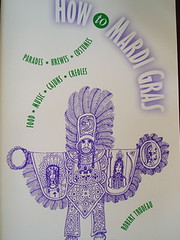
The most comprehensive guide to Louisiana's Carnival season: How To Mardi Gras
Originally uploaded by trudeau
- Colorful title (2 pts)
- Sensual opening (quote or description) (2)
- Detail (events, locations, dates, people) (4)
- Grammar, speeling, construction, logical flow
(2)
- Documentation (according to HTMG) (2)
12 pts.
Highest levels of thinking!
Wednesday, January 9, 2013
Making large masks in FAS
- Review of global celebrations via How To Mardi Gras.
- Review of the global scope of mask making at http://masksoftheworld.com.
- Using large-scale design by gluing together 4 sheets of paper.
- Choosing a design that reflects a non-Louisiana culture.
- Color.
- Completion: 6 pts.
- Review of the global scope of mask making at http://masksoftheworld.com.
- Using large-scale design by gluing together 4 sheets of paper.
- Choosing a design that reflects a non-Louisiana culture.
- Color.
- Completion: 6 pts.
Monday, January 7, 2013
Mardi Gras and Carnival season quiz
1. New Orleans African heritage: a) West b) East c) North
2. translate: bons
3. translate: rouler
4. translate: laissez
5. translate: temps
6. translate: gras
7. Louisiana's carnival season does not begin on a) Twelfth Night b) Epiphany c) Jan 6 d) Ash Wed.
8. Dionysian celebration: a) Greek b) Roman c) Persian.
9. Lupercalia: a) Greek b) Roman c) Persian.
10. Translate a) Carne: ___ b) vale: ___
11. Translate: "Lent."
12. First 5 nations associated with carnival.
13. First historic era in which Carnevale is written about: a) Medieval b) Renaissance c) Elizabethan.
14. Examples (2) of riotous behavior.
15. Translate: Shrove Tuesday.
16. Female krewe in New Orleans.
17. Why were parades instututed in New Orleans about 1857?
18. Two European cities that estabish the early carnival customs.
19. First krewe of Louisiana.
20. Alabama location with considerable influence on New Orleans (NO) Carnival?
21. 2 differences between Alabama and NO celebrations.
22. Primary public activity that was considered a basic pleasure of the pioneer days?
23. The location of Congo Square in New Orleans?
24. Activities by slaves in Congo Square? Frequency?
25. The second oldest krewe?
26. 3 customs established by Rex.
27. Etymology of “Rex.”
28. Make a timeline of Comus, Rex and Zulu.
29. Cheap coin “throw”?
30. Mardi Gras has neighborhood clubs that call themselves "gangs."
Are they a) MG Indians b) Drug organizations c) Brass bands.
31. What organization is brought to mind by the phrase “two-way pocky way!”?
32. Blanc et Noir Marching Society will hire what sort of band for the Krewe of Highland parade?
33. When did jazz music begin?
34. In what kinds of bands did jazz begin?
35. Explain the meaning of the French term "boeuf gras."
36. What are the flambeaux?
37. A famous Louisianian signed his letters, “Red beans and ricely yours,” His name and nickname?
38. What is one of the themes of New Orleans costuming?
39. How long did French immigrants live in Nova Scotia before a journey that would take them to Louisiana?
40. Why are they called Acadians, or Cajuns?
41. What is the name for the Cajun Mardi Gras?
42. Another name for a Cajun house party?
43. What 2 types of music mingle in Zydeco?
44. What ethnic group created zydeco?
45. Make a small map featuring Europe, South America, Central America and North America. List nations in which we see a significant carnival celebration.
2. translate: bons
3. translate: rouler
4. translate: laissez
5. translate: temps
6. translate: gras
7. Louisiana's carnival season does not begin on a) Twelfth Night b) Epiphany c) Jan 6 d) Ash Wed.
8. Dionysian celebration: a) Greek b) Roman c) Persian.
9. Lupercalia: a) Greek b) Roman c) Persian.
10. Translate a) Carne: ___ b) vale: ___
11. Translate: "Lent."
12. First 5 nations associated with carnival.
13. First historic era in which Carnevale is written about: a) Medieval b) Renaissance c) Elizabethan.
14. Examples (2) of riotous behavior.
15. Translate: Shrove Tuesday.
16. Female krewe in New Orleans.
17. Why were parades instututed in New Orleans about 1857?
18. Two European cities that estabish the early carnival customs.
19. First krewe of Louisiana.
20. Alabama location with considerable influence on New Orleans (NO) Carnival?
21. 2 differences between Alabama and NO celebrations.
22. Primary public activity that was considered a basic pleasure of the pioneer days?
23. The location of Congo Square in New Orleans?
24. Activities by slaves in Congo Square? Frequency?
25. The second oldest krewe?
26. 3 customs established by Rex.
27. Etymology of “Rex.”
28. Make a timeline of Comus, Rex and Zulu.
29. Cheap coin “throw”?
30. Mardi Gras has neighborhood clubs that call themselves "gangs."
Are they a) MG Indians b) Drug organizations c) Brass bands.
31. What organization is brought to mind by the phrase “two-way pocky way!”?
32. Blanc et Noir Marching Society will hire what sort of band for the Krewe of Highland parade?
33. When did jazz music begin?
34. In what kinds of bands did jazz begin?
35. Explain the meaning of the French term "boeuf gras."
36. What are the flambeaux?
37. A famous Louisianian signed his letters, “Red beans and ricely yours,” His name and nickname?
38. What is one of the themes of New Orleans costuming?
39. How long did French immigrants live in Nova Scotia before a journey that would take them to Louisiana?
40. Why are they called Acadians, or Cajuns?
41. What is the name for the Cajun Mardi Gras?
42. Another name for a Cajun house party?
43. What 2 types of music mingle in Zydeco?
44. What ethnic group created zydeco?
45. Make a small map featuring Europe, South America, Central America and North America. List nations in which we see a significant carnival celebration.


